A Backpacker's Travel Guide for Iraq & Iraqi Kurdistan
- IDreamofMangoes
- May 30, 2024
- 25 min read
Updated: Mar 3, 2025
In this backpacker's travel guide for Iraq and Iraqi Kurdistan, we will go over everything you need to know to visit Iraq - which is perhaps one of the most misunderstood and misrepresented countries in the world.
We had such a fantastic time in Iraq, and I'll say it now, there were zero safety concerns whatsoever. I am not saying that you should ignore your government travel advice completely, but just know that it is very politically biased. So before you write off visiting a country, join travel forums (like the Iraqi Travellers Cafe), speak to people who have been there, and seek real on-the-ground information from locals.
CONTENTS
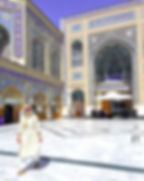
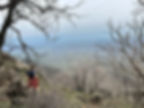
RELATED POST: The Top 5 Things to Do and See in Türkiye |
|---|
About Iraq
I am going to give you a VERY SIMPLIFIED version of Iraqi history, so you get an idea of why Iraq has the reputation it has today. If you just want to know about travel to Iraq, you can skip this part!
Iraq is nicknamed 'the cradle of civilisation', as the Mesopotamian peoples developed the world's first written script, as well as some of the first literature, mathematics, philosophy, and laws. This was all thousands of years ago when Europeans were still living a primitive life as hunter-gatherers!
In the 1600s Iraq was swallowed by the Ottoman Empire, and it stayed this way up until the end of World War 1. After winning the war in 1916, Britain and France chopped up this part of the Ottoman empire into smaller portions to serve themselves. The French took Syria and Lebanon and the British took Jordan, Palestine, and Iraq. When you look at the volatility of this region now it can all be traced back to this f*ckery caused by the British, as usual.
This hap-hazard map drawing that the Brits are so fond of also caused the Kurdish people to be split into four countries, which may be the saddest outcome of all (but that is a story for another day).

The British got kicked out, came back, and left again - and finally, they supported Saddam Hussein coming to power in 1979. During his rule, Iraq was the second largest producer of oil in the world, and there was a lot of money in the country.
Then Saddam's tyranny went full-scale with war, genocide, chemical weapons, and a lot of bombs. He invaded his neighbours, created a psychotic child army, and the list goes on. (We mustn't forget the lingering Western influence pulling strings and profiting all the while, it is well documented S.H. was a CIA informant long before he came to power).
Then the USA and its friends invaded Iraq for their own motivations (oil) under the guise of 'saving' the Iraqi people. They bombed indiscriminately to reach their goal. Saddam Hussein was executed, and the USA utterly failed in its responsibility to help Iraq get back on its feet.
What followed was a lot of poverty, discontent, and a huge power vacuum. This made room for extremists - as people were desperate for change. Enter ISIS. Watch the film 'Rojek' for more info on that.
Again, it was the Iraqi people who suffered. By 2017, the Peshmerga (Kurds) who had been fighting for their own freedom for decades, defeated ISIS with help from Iran and the West.
As of 2021 Iraq is now peaceful and safe, and its doors are open to tourism for the first time in more than 40 years, but they can't shake their bad reputation. Well, let's change that.
(I am well aware that the history of Iraq is far more interesting and nuanced than this, but this is a travel blog after all, so I have tried to keep it short!)

RELATED POST: Is it Safe to Travel Africa? and other myths debunked... |
|---|
Visas
Iraq offers a visa-on-arrival service for UK Citizens, and while E-visas were available for some nationalities, as of March 2025 this service has been suspended.
The VOA is fairly straightforward, you just fill out a form in the 'holding area' before you pass through immigration, and pay $80 USD in cash (the exact amount). You'll need the name of your first hotel for this form, but this is not followed up, so if you're couch-surfing just choose any hotel.
Depending on how busy it is, it can be quick and painless or a little slow. We waited about 45 minutes, but we were being processed at the same time as about 30 Indian men who had come over to work.
This is a single-entry visa for 60 days - which means you can't nip to Kuwait for a day and come back without getting a new visa.
It is important to know that if you land in Federal Iraq i.e. Baghdad, your visa is valid for Kurdistan too. Some Kurdish military officers at checkpoints don't know this, so there is a chance you'll have to fight your case until they ring a superior and you are proved right and allowed to pass.
Prior to 2025, if you landed in Kurdistan i.e. Erbil, your Kurdistan visa on arrival would not be valid for federal Iraq. You could not be issued one simply by driving in, you needed to fly from Erbil to Baghdad to get a VOA for all of Iraq – which is why it made much more sense to begin your travels in Iraq in Baghdad.
HOWEVER as of very recently, this has 'apparently' changed, and a visa issued from Kurdistan can now be used for all of Iraq. As this is a new thing, there is some confusion so I would triple-check this before you travel.

RELATED POST: 5 Road Trip Ideas for the adventurous traveller in 2025 |
|---|
Money & Budget
The currency in Iraq is Iraqi Dinar and at the time of writing, 2000 IQD is about £1.20
However, Iraq is one of the many countries where American Dollars will take your money much further - so I strongly recommend bringing the majority of your spending money in USD. You should procure your dollars before you arrive in Iraq.
The black market exchange rate for dollars is a fair bit higher than what you would get from using ATMs. Currently, it is sitting at about 1500 IQD to the dollar. Hotels and tour guides readily accept USD instead of dinar, and many prefer it. Make sure the notes are high denomination ($50 or $100 ideally), and that they are new, crispy, and clean.
In bigger cities like Baghdad, Basra, Erbil, and Sulaymaniyah, ATMs are very common, however sometimes they do not work with foreign cards, they are often out of service, or they only accept Mastercards and not Visa or vice versa.
Bringing enough USD will save the headache of traipsing around looking for a suitable ATM, but in case of emergency do not worry, you will definitely (eventually) be able to withdraw cash. Very few establishments accepted card payments for us, not even in big hotels and shopping malls.
It is possible to travel in Iraq on a backpacker's budget, couch-surfing is alive and well, and you can get a delicious, large falafel bap from a street vendor for 50p! Drinking water is free in almost every hotel and restaurant, and public transport is quite affordable. We spent about £1200 in 3 weeks between the two of us, all in (excluding flights).

When to Go to Iraq
Iraq is roasting in the Summer and freezing in the Winter, so the best time to visit is Spring and Autumn.
More specifically the best months to visit Iraq are: March, April, May AND October.
Keep an eye out for when Ramadan falls, as it becomes a little bit trickier to travel during that month. I travelled during Ramadan this year, and I would not do it again. I'll explain why in the section: Challenges when travelling to Iraq.

Getting to Iraq
Theoretically, you can enter Iraq overland from Türkiye, Saudia Arabia, or Kuwait, or you can fly into several international airports, but this article refers to flying into Baghdad.
You can buy a Zain sim card at the airport (closed on Fridays) and it's just a quick 20-minute ride to the city. It is worth noting that the Baghdad airport taxi 'mafia' DO NOT make a good first impression – they are quite aggressive and massively overcharge for this very short journey. Do not let this put a downer on the beginning of your trip, as NOT ONCE elsewhere in Iraq did we experience this behaviour.
I have been told as of 2025 the airport taxi mafia no longer operates, and all taxis are now allowed access to the airport zone
Once out of the restricted zone near the airport, and you have your Zain sim card up and running, you can order a BALY or CAREEM to get around.
BALY is Iraqi 'Uber', it is cheaper but not available everywhere, it is only in Arabic
CAREEM is UAE-based and better for use in Kurdistan, it has an English option

Getting around Iraq
WITHIN CITIES
We used taxi apps to travel within cities when the walking distance was longer than an hour, otherwise, we walked. We found all Iraqi cities to be fairly 'walkable' - if you've ever been to Kuala Lumpur or Los Angeles those are my references for cities that are 'not walkable'.
Careem works in most cities in Iraq (not in Duhok). You can download the app with a foreign number and connect it to your bank card to pay, although it is a bit more expensive than Baly.
For Baly you'll need an Iraqi number, and we always paid in cash. Baly did not work for us in Kurdistan.
If you would rather just flag down a taxi, they are readily available and we never waited longer than a minute or two for one to stop. However, it is difficult to haggle a price without a ballpark figure.
We found that older taxi drivers always gave us a fair price - some even refused our money and we had to insist several times before they accepted. The younger generation tried their luck and it became necessary to haggle, which is why we always used Baly as a first choice.

BETWEEN CITIES + TOWNS
We used public transport to travel between our major stopping points. Our first choice was a mini-van, which is the cheapest, and if that was not available – a shared taxi.
Both of these transport options only depart when they are full, so shared taxis tend to take off more quickly. That being said, we never waited longer than an hour for our minivan to fill up, and that was even during Ramadan when people travel less.
For our full itinerary including shared transport prices and journey lengths, skip ahead to My 3-week Itinerary for Iraq (including Kurdistan).
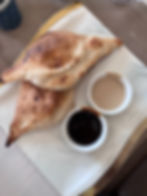
GARAGES IN IRAQ
The below is a list of all the garage locations in cities and major towns in Iraq. 'Garages' is the name given to the minibus and shared taxi terminals, and this list was copied from the Facebook group: The Iraqi Traveller's Cafe – which you should absolutely join before your trip to Iraq. It is a great way to connect with locals, seek advice, and share knowledge.
All credit goes to its original author: Mohammed Talal Al-Mesdany. We referred to this list many times during our 3-week trip around Iraq.
List of all the garages in Iraq:
Baghdad:
- Al-Alawi garage “mainly to the south of Iraq, but even you can find to Mosul from this garage also”.
- Al-Nahdha Garage “mainly to the north of Iraq”:
Babylon “Babil, or Hilla”:
Karbala:
- Al-Garage Al-Mowahad:
- Garage to Hilla “Babylon”:
Najaf:
- Baghdad Garage “to the north”
- Garage Al-Najaf Al-Janoby “to the south”
Nasiriayh:
Al-Chibayish Garage “The Marshes”:
Basra:
Garage Baghdad (Sahaat Saad):
Samarra:
Tikrit:
Al-Shirqat:
Mosul:
- Garage Baghdad “to the south”
- Garage Al-Shemal “to the north”:
Duhok:
Erbil:
- Garage Baghdad and Sulaymaniyah “to the south and east”
- Erbil Terminal “to the west” and to Turkey and Iran “lots of travel companies there”
Sulaymaniyah:
- Sulaymaniah Terminal
- Sharazur Terminal “to Halabja”

TRAIN
There is an overnight train service from Baghdad to Basra (and vice versa) which has a few stops on the way. After completing our 'southern circuit' of Iraq we took the train from Basra back to Baghdad.
The train departs Basra every day at 8:30pm, and tickets cannot be booked in advance, but instead you should show up on the day. If you want a first-class 'private room' – you should show up at 7:45am when the station opens, as these tickets sell out quickly. It was 30,000 IQD per person and quite comfortable, but if you're squeamish about dirt just don't look at anything too closely!
If you are travelling with a partner or a friend of a different gender, you will not be able to share a cabin unless you show the ticket officer your marriage certificate. This was the one and only time we were asked to prove we were married for the entire time we were in Iraq.
The train arrives into Baghdad around 7am the following day, with some nice views as the sun rises. Make sure to bring water and snacks.
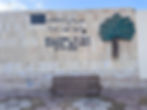
HITCH-HIKING
Hitch-hiking is also acceptable in Iraq, but the officers at the military checkpoints are not fond of it, and I have heard many stories of people being sent back. They are really just looking out for your safety and like to see foreigners in official public transport or taxis, and sometimes they will make the driver take you to the hotel door instead of the garage, this happened to us in Nasiriyah. In Kurdistan, this is less strict.
Military Checkpoints in Iraq
We passed through hundreds of military checkpoints in Iraq and Kurdistan, sometimes we stopped every 20 minutes! I began to notice that if I wore a hijab and looked down at my phone we were stopped less, as if they spotted my blonde hair the process would take longer.
Sometimes they waved us through without noticing us, sometimes we passed our passports out the window, they glanced over them and handed them back. Many, many times we had to exit the vehicle and go to the 'superiors' office, someone in a suit who had a smidge of English. He would make a call and take photos of our passports and photos of our intended hotel.
We couch-surfed many times but we always had a hotel we pretended to stay in - we just found a cheap one in the city and screenshotted the address but didn't make a reservation or stay there. This was never followed up.
The military and police were always friendly, courteous, and extremely professional. There was not even a whiff of corruption, power-tripping, or hostility (even though we are British). Every one of the hundreds of interactions at checkpoints was pleasant.
P.S. DO NOT TAKE PHOTOS AT/OF MILITARY CHECKPOINTS
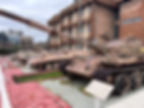
Dress Code in Iraq
What you should wear as a female traveller in Iraq really varies from place to place. Technically, as a multi-faith country, the hijab is not a requirement – with some exceptions.
Karbala:
An Abaya and a Hijab are required for female travellers to Karbala, and you can easily buy an Abaya or Chador at the city gates if you do not have one already. If you are wearing sandals, you should also wear socks (snazzy!) I did not have any socks - they still let me in but I got a lot of stares. Abayas are incredibly awkward if you are not used to them so I am very glad I only had to wear mine for one day.
Najaf:
You must wear a hijab in the old city, and they are quite strict about having every piece of hair covered.
Even though it was not required, I also wore a hijab in Nasiriyah as it seemed quite a traditional place, and I wore it on public transport purely so we didn't get stopped so much.
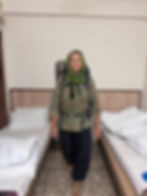
Baghdad + Basra:
In the modern cities of Baghdad and Basra, appropriate dress for female travellers is long loose trousers and a loose-fitting top beyond the elbow.
Basra was the only place I encountered an issue by not wearing a hijab, a local shopkeeper was under the impression that as it was Ramadan I should be wearing one even though I am not Muslim. My Iraqi friend told him I don't have to wear one and the shopkeeper got more and more irate so we left quickly. This is the only single 'hijab issue' I had in Iraq, but I am fully aware there are preachy people everywhere in the world.

Sulaymaniyah, Erbil Duhok (and the rest of Kurdistan) :
Female tourists would not stand out wearing T-shirts, leggings, and skirts below the knee (weather dependent). Many local girls wore clothes like this too and I was taking my lead from them.
Wherever we travelled, I always kept a scarf with me in case we went to a mosque – where hijabs are required.

Accommodation in Iraq
Unless you pay big bucks, accommodation is not of a very high standard in Iraq. However, we had just come from East Africa and were well used to slumming it, so the hotels we chose in Iraq were a step up!
We did a mixture of couch-surfing and hotels. We probably could have couch-surfed the entire time but that would have been too much for me, as I need time to recharge my social batteries.
HOTELS
We paid between 25,000 – 60,000 per night for hotels. All of the details can be found in the section: My 3-week itinerary for Iraq & Iraqi Kurdistan.
COUCH-SURFING
With couch-surfing, normally you are expected to treat your host to dinner or put some petrol in their car, as a small gesture to say thank you. Unfortunately, we did not get the opportunity to do this in Iraq, as not only was it Ramadan but the Iraqi people are so generous and have such a prideful sense of hospitality, nobody let us do anything for them. One day we will repay the favour and host anyone from Iraq once we get our farm set up in Colombia!
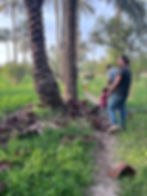
Safety in Iraq
I'll say it – Iraq is one of the most misrepresented and misunderstood countries in the world. It is not how it is portrayed AT ALL.
There was not one moment in Iraq that I felt unsafe, even walking around at night or using my phone on busy streets which I do not normally do when travelling. Things like pickpocketing just don't really happen, and in outdoor markets, they just cover up their wares with a plastic sheet and return the next day. Nobody steals it.
Do you know how long that stuff would be there before someone stole it in my home city of Bristol in the UK? No more than 5 minutes. Even if it was locked up someone would get at it with some metal cutters.
I was never once made to feel uncomfortable by men, and if you're a female traveller you'll know this can happen daily in many countries. I was travelling with my husband so I know it's different, but I have spoken to solo female travellers in Iraq who say the same – zero hassle.
All this stuff you see on the news about missile strikes from the USA and Iran sounds scary but can go unnoticed on the ground unless you are the target. And why should the Iraqi people suffer (again) due to foreign interference?
As British tourists (this goes for Americans too) -you may assume that there is some hostility from Iraqis towards us for obvious reasons, but there is none.
They are smart enough to know that the disgusting actions of our governments have nothing to do with us. It's a shame Western people can't come to that conclusion too but instead assume all Iraqis are terrorists. This sounds harsh – but this is what people think – and I hope with my posts about Iraq I can change at least a few minds about that.
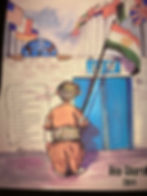
As the locals like to say, the only thing dangerous about Iraq is that you will put on weight from all of the delicious food!
Oh and the driving, beware of the driving. The erraticness of the driving in Iraq hovers somewhere slightly worse than in India, but better than in Mexico!
Challenges when travelling in Iraq
I think what makes my blog unique is that I write honestly. I am not selling you a travel package, I am telling you how it is from my view. Everywhere you travel there are negatives, some more than others, and these are the challenges I faced when travelling in Iraq and Iraqi Kurdistan.
Being a woman: As a woman, travelling with a man, mostly the interest and conversation was directed at my partner. I know people are doing this out of respect, but as a woman accustomed to my 50% - feeling invisible can be a bit annoying at times.
Iraqi women: 90% of our interactions with locals were with men. While some areas/families were open-minded and the women were social, in many instances the women were just hidden behind closed doors, and at times we really felt like we were missing the female influence in conversation and society, and it made us a little bit sad.
Ramadan: It was challenging to travel during Ramadan, I won't lie. Food is limited during the day (it is mostly kebabs) and no businesses update their hours online for Ramadan, so it is impossible to know who is closing entirely, staying open, or switching to nighttime hours. Many businesses use Ramadan as a chance to renovate and close completely, and as people travel less, public transport is less frequent. If I were to travel to Iraq again I would not come in Ramadan, as much as I enjoyed the Iftars!
USA Visa: By coming to Iraq, our USA ESTAs are cancelled and in order to EVEN TRANSIT in the USA we need to apply for a 10-year visa and have an interview (which can take 6 months to arrange!) This is one of the many prejudices Iraq faces and is completely unwarranted. We are yet to find out if our visit to Iraq affects our entry into any other countries, but I will keep this section updated!
Insurance: Many companies will not offer insurance for places that your government advises you not to go. For Iraq, we did not get insurance which was probably not the smartest move but hey ho. I have however recently discovered I Safety Wing, who do insure for Iraq, so now use their 4-week rolling policy every time I travel. I have claimed with them and it was super smooth, so no complaints so far!
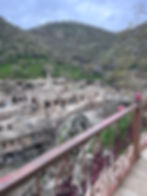
My 3-Week Itinerary for Iraq & Iraqi Kurdistan
We spent 3 amazing weeks in Iraq, including Kurdistan, in March 2024 – and this was our itinerary. This section contains important information on the best budget hotels in Iraq, the price of public transport in Iraq and how to get around, and all of our favourite things to do in Iraq.
Where we stayed:
1. Baghdad – 3 Nights
Hotel Kasr Al-Barakat – 60,000 per night, they accepted $40. They charge per person, so it is 30,000 per night each. Good location, good wifi, and breakfast included.
2. Karbala – 1 Night
Couchsurfing in the smaller nearby town of Hindeyah.
3. Najaf – 1 Night
Yaseen Hotel – 25,000 per night for a double room within the old city. Simple lodgings but no complaints. They insist on keeping your passport behind the front desk for the duration of your stay.
4. Nasiriyah – 1 Night
Hamurabbi Hotel – 30,000 per night for a double room, they accepted $20.
5. The Marshes – 1 Night
Abu Haider's House - $100 for two people including lunch and dinner, a 2-hour tour of the marshes at sunset and breakfast the following day.
6. Basra – 2 Nights
Couchsurfing
7. Baghdad – 2 Nights
Hotel Kasr Al-Barakat
8. Sulaymaniyah – 2 Nights
Dolphin Hostel – 50,000 per night for a very small room. Nice owner and good wifi but a bit pricey for what it is.
9. Erbil – 5 Nights (Day trips to Akre + Mosul)
MyHotel – 33,000 per night with a Genius discount on booking.com - good breakfast included and decent wifi.
10. Duhok – 2 Nights (Day trips to Alquosh + Lalish)
Couchsurfing
Would I change anything about my 3-week itinerary?
We would have loved to spend more time exploring the smaller towns of Kurdistan, such as Rawanduz and Amedi, and camping in the mountains.
Unfortunately, it rained torrentially almost the entire time we were in Kurdistan, which is why we were holed up in our hotel in Erbil for 5 nights. Erbil is not that interesting, but it makes a great base for day trips.

BAGHDAD – 3 Nights
We loved Baghdad, it was our favourite place in all of Iraq. We stayed there 5 nights all together, 3 initially and 2 more later on, and we probably would have stayed longer.
Our time in Baghdad was mostly spent walking and eating, and rightfully so. We met up with several people from the Iraqi traveller's Cafe and Joe even went out painting with a local graffiti crew!

Things to do in Baghdad
Stroll down Al Mutanabbi Street, both during the day and at night
Enjoy the lively streets of Inner Karada in the evening
Window shop at the chaotic Al Rasheed Street
Find the ancient Copper Market
Enjoy a Lime Tea at the iconic Shabander Cafe
Indulge in Kubbe at Kubbe Saray – our meal here was paid for by a family on the next table as a 'Welcome to Iraq'
Indulge in the classic Iraqi breakfast at Orfali's Kahi
Try Iraq's national dish of Masgouf cooked the right way at Baghdadi Restaurant
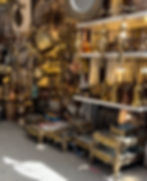
KARBALA – 1 Night
To get from Baghdad to Karbala head to Allawi Garage, where you can grab a minivan for the 2-hour journey for 7000 Iraqi Dinar.
Many people stop at Babylon on the way, an ancient city in modern-day Hillah that has been a UNESCO World Heritage Site since 2019. The ruins have not been preserved very well but if you're into that stuff it's worth a visit, the entrance ticket is 25,000.
The main reason people go to Karbala is to visit the beautiful Imam Husayn Shrine - the second holiest site for Shia Muslims. The entrance is free but you WILL experience a lot of pushing and shoving, we only lasted 5 minutes. Men and Women go to separate parts and you cannot take photos inside. As the shrine is important to Shia Muslims, it is very popular with Iranian tourists so people will automatically assume you're Iranian if you are foreign!
We couch-surfed at a cute family farm in Hindeyah, a town about 20 minutes outside of Karbala. Being in the rural, traditional South, almost all women were fully veiled and hidden behind closed doors. Joe even had to time his bathroom visits so he didn't accidentally bump into a woman. Even though this experience was a bit strange for us, we were treated exceptionally well by our host and stuffed with food all day and night.
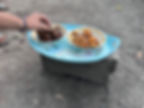
NAJAF – 1 Night
You can easily grab a minivan from the garage in Karbala to get to Najaf, the price is 3500 Dinars and the journey is only 1 hour.
Our main reason for visiting Najaf was to meet Maram, a connection from the Iraqi Travellers Cafe and an English teacher. We met Maram's students and talked about love and life, and afterwards, Maram treated us to a meal of Yemeni Mandi.
I think as is obvious, we are not that into sightseeing but rather spending time with people and sharing food. That being said, Najaf is home to one of the most beautiful shrines in the world, the Imam Ali Shrine, as well as the Kufa Cemetery which is the world's largest graveyard. More than six million bodies including those of prophets, kings, and scientists, are buried in the cemetery, spread over an area of 917 hectares. According to UNESCO, burials have been taking place in the cemetery for more than 1400 years.
Being a holy city, we really struggled to find anywhere to eat during the day in Najaf. At one point, a security guard at a closed restaurant took pity on us and chased us down the road to give us the orange from his pocket. One of the many times the Iraqi people have touched my heart with their kindness.

NASIRIYAH – 1 Night
You can get a minivan from Najaf to Nasiriyah for 10,000 IQD, the journey length is 3 hours.
Our main reason for staying here was to rest our heads before moving on to the Marshes, although many people stop at the 4000-year-old temple, The Ziggurat of Ur, along the way.
In Nasiriyah, we went for an evening stroll where the locals were very friendly and often offered us free snacks and tea from their street stalls.
The MARSHES – 1 Night
You can take a minivan from Nasiriyah to Al Chibayish for 3000 Dinar, the journey will take 1 hour. From there, a friendly local gave us a lift to Abu Haider's house for free, as he is very well-known in the area.
We arranged our stay with Abu Haider via a 3rd person as he does not speak English, but here is Abu Haider's number: 009647811423803.

Abu Haider normally charges something like $70 per person, but we got a discount through this 'mutual friend' and paid $100 for the two of us. You can probably get the same offering much cheaper if you turn up at Al-Chibayish and ask around for a tour, but Abu Haider is famous for his singing.
Due to a shoulder injury, our tour guide was Baby Haider, so no singing, but the marshes are beautiful. We visited their family farm and afterwards, they served us delicious food and we slept in a traditional house. The mosquitoes are INSANE, my whole body was covered with blankets but I woke up with 24 mosquito bites on my face, so be aware of that.

BASRA - 2 Nights
Abu Haider arranged a private taxi for us from Al Chibayish to Basra for 30,000 IQD which took 2 hours.
Basra does not have the charm of Baghdad, but it is still nice to stroll around the old city during the day, and then along the corniche in the evening. Our lovely couch-surfing host Hassan took the day off from work to show us around the city, and he was great company.
We paid 10,000 for a little boat trip around the harbour and gawked at curious antique shops whilst drinking delicious fresh pomegranate juice. It was also interesting to visit the Imam Ali Mosque, which is the oldest mosque outside of Saudi.

BAGHDAD - 2 Nights
We really enjoyed the overnight train from Basra to Baghdad, all of the details of which can be found in the section: Getting around Iraq.
Whilst we were buying tickets for the train we did not have the correct change, and the guy behind us in the queue named Awab not only contributed towards the ticket but also took us out for breakfast afterwards and shared stories of his time working for the US military during the retaking of Mosul. Later that night when we came back to the train station to board our train, Awab and his wife had packed us a dinner. Again, we are continuously blown away by the hospitality, kindness and generosity of the people of Iraq.
In Bahdad take 2 we met some people from the Iraqi Travellers Cafe for dinner and a competitive game of Uno, we went for Iftar at our taxi driver's house (which was fantastic, thank you Tariq) and Joe met up with a local graffiti crew, and he may be officially the first person to ever paint a train in Iraq.

SULAYMANIYAH – 2 Nights
Also known as Suli or Slemani, this 3-week itinerary for Iraq is now entering Kurdistan, the semi-autonomous mountainous North of the country.
To get here, head to Baghdad's Alnahda Garage – where you'll pay 25,000 for a minivan, for a 6-hour journey including half an hour for a lunch stop.
The highlight of Suli for us was the Amna Suraka Museum – a free museum about the Kurdish struggle packed with information. It is only open from 9am til Noon, and 1pm til 4pm - and you really need at least 3 hours to get around it. This may have been the best museum I have ever been to and there is no entry fee.
It rained torrentially while we were in Slemani so we didn't do much else apart from hanging out in Sbeiy Coffee House and Zhyari Kurdawary Restaurant - I would recommend both.
Many people take a day trip from Suli to Halabja which is 1 hour away and the site of the Halabja Massacre but as I said, so much rain.

ERBIL - 5 Nights
You can get a shared Taxi from Slemani Terminal to Erbil for 15K – although we were charged 20K because it was Newroz (Kurdish New Year) and they couldn't find a 4th passenger.
Again, it rained unrelentingly in Erbil so we couldn't do as much as we would have liked. To make matters more frustrating, normal 'indoor activities' like going to the cinema were all impossible due to these types of businesses being closed completely during Ramadan.
We strolled around the Old Citadel and the Main Bazaar, and then we hopped over to Ankawa to enjoy our first and only beer in Iraq at a German Beer Bar. We also indulged in what would have been our umpteenth Yemeni Mandi - it is just SO good.
When the sun finally broke we jumped at the chance to hike Mount Saffeen, a 5-hour there and back hike about 45 minutes driving out of Erbil. We went with a local hiking enthusiast named Soran whom we met through another traveller, he was fantastic company and the hike was stunning.

Day Trip: AKRE
We timed our visit to Akre with Newroz; Kurdish New Year. The rain was abysmal so rather than spending the night, we just went to Akre for a couple of hours between 6pm - 8pm, which is when they do the famous fire walk up the mountain. The taxi was 60,000 each way - which is a bit expensive for our normal budget but we knew it was a once-in-a-lifetime thing.
We met a kind local guy named Jagar, who sprung upon us that we would be interviewed live by Kurdistan's biggest television network. Joe, as expected, aced it and answered loads of questions about Iraq on live national TV!
Normally at Newroz, everyone shoots their guns into the air, but thankfully as the President was in town no guns were allowed this year.
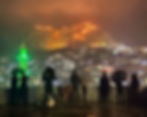
Day Trip: MOSUL
For the 1.5-hour journey from Erbil to Mosul, the price is 6,000 for a minivan or 10,000 for a shared taxi. As you are passing BACK into Federal Iraq from Kurdistan, you can expect some confusion over your visa. We were delayed by 30 minutes while the military officers kept checking we had the correct visa, but the other passengers did not mind the opportunity to chain-smoke.
Mosul Old City is the most interesting part, although expect your heart to break as you see all of the bullet holes and rubble. Despite the oh-so-fresh wounds of the city, the markets are lively and the people are very friendly and welcoming.
Half a day is enough to get a feel for Mosul - although I have been told by many people that this city has the best food in all of Iraq, we just did not get to experience it due to Ramadan.
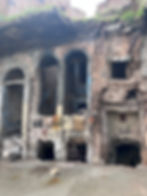
DUHOK - 2 Nights
We took a shared taxi from Erbil to Duhok for 15,000 and used Kathleen's Cat House as our base to explore Alquosh and Lalish.
Due to fewer people travelling in Ramadan, we could not find public transport to these two towns so we had to fork out for a taxi.
Duhok to Alquosh taxi: 30,000
Alquosh to Lalish taxi: 50,000
Lalish to Duhok taxi: 30,000
For the regular shared taxi price, divide these prices by four.
Alqosh
Alquosh is a very pretty Christian town and we LOVED the well-preserved Heritage Museum. To enter the museum you'll need to phone the number painted on the door, and the manager will come down and open it up for you, for a 2000 IQD entry fee.
We spent about an hour looking at the museum's curiosities and enjoyed a chai with the manager before starting the 1-hour hike to the monastery in the mountain. We did not make it all the way, due to a recent rockfall from all the rain, but it was still nice to view from below.
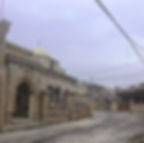
Lalish
Lalish is a holy site for Yazidis, who are a Kurdish religious minority in Iraq. Yazidi people believe in a fallen angel, and are mistakenly called devil worshippers by many groups, including ISIS. It could be fair to say that the one million or so Yazidis suffered the most under ISIS, and I would suggest reading up on this history before visiting Lalish or the Sinjar Mountains.
Once you reach Lalish you must leave your shoes at the entrance to the city, so I suggest bringing very thick socks to wear - as the floor is gravelly in places and freezing cold!
Whilst in Lalish, always step OVER a raised door frame, NEVER onto it (I don't know why, but the look of sheer horror on a local boy's face when we ignorantly stepped on a door frame said it all).
Try to time your visit to Lalish with late afternoon/sunset, which is when all the town's lanterns are lit, and be sure to explore the tombs full of amphorae filled with homemade olive oil.
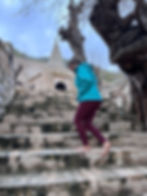
Thank you for reading my backpacker's travel guide to Iraq! We ended our 3-week Iraq itinerary by heading back to Erbil, for a cheap last-minute flight with Pegasus Air to Ankara in Turkiye.
I think it's pretty obvious we had an amazing time in Iraq, which will now be known to me as the country with the world's best people and the world's best bread.
If you enjoyed reading my backpacker's travel guide to Iraq, please consider subscribing to my blog where I post articles once per week filled with travel tips, inspiration, and stories from my adventures around the world.
Happy Travels
xx

























